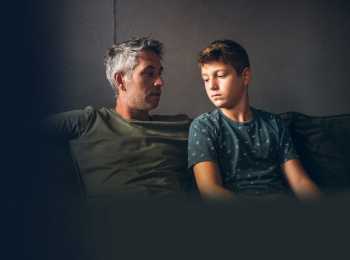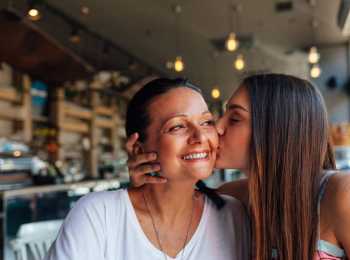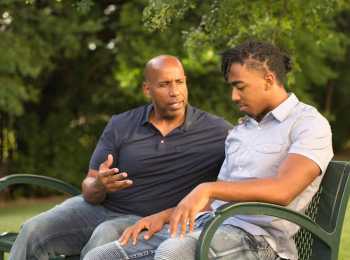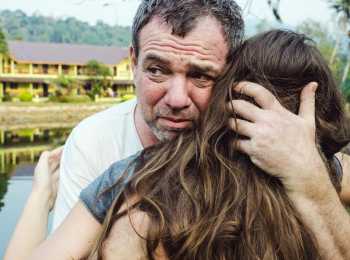Having the right information is an important way to help you understand and cope with what’s going on. For some people having all the information is important; for others just the key bits are enough for now. Whether you want it all now or just the basics, it’s important to get accurate information from trustworthy sources and people who know about your mum’s or dad’s cancer.
You can get general information about common cancers and different treatments across the site.
Every cancer and every patient is different. So to understand your parent’s cancer and what is likely to happen to them you need to get the facts from your mum or dad, or talk to their doctor or someone in their treatment team.
Questions you might ask
Here are some questions that you may want to ask your parent, or ask their doctor, nurses or social worker. You may need to remind them to speak in plain English, not doctor language.
-
What kind of cancer is it?
-
What part of the body does it affect?
-
Will my mum/dad get better?
-
Is there a chance that I may get this cancer too?
-
What treatment will they have?
-
Will there be more than one type of treatment?
-
How will my mum or dad feel while they are having this treatment?
-
Is the cancer painful?
-
Will the treatment be painful?
-
How often do they get this treatment and how long will it last?
-
Will it change the way my mum/dad looks, feels or acts?
-
How will we know if the treatment is working?
-
What will happen if the treatment doesn’t work?
-
Where will they get this treatment and can I go with them?
If you have other questions, write them down or make notes on your phone so you have them ready when you next see the doctor, nurse or social worker.
There is a thing called ‘patient confidentiality’ – which means doctors and other health professionals can’t tell you about your mum’s or dad’s treatment or their prognosis (what the outcome may be) without their permission. You can ask your parents to give the doctor permission to give you information. But if your mum and dad has told the doctor that they do not want you know some things then the doctor has to obey those wishes.
What if mum or dad won't tell me
For some parents not telling the whole story is a way of trying to protect you. Try explaining to them how important it is to you to know what’s going on, so you don’t start thinking or worry about things that might be worse than reality. Get some ideas and tips for talking about cancer.
You could ask your mum or dad if you can go with them to their appointments. It can help if you are just there to hear what’s going on, and ask the doctor questions.
Their treatment team should include a social worker or psychologist at the hospital or in a community centre who can talk with you about things you’re worried about and help you find more information. As part of the family, you have the right to access these professionals on the team as well!
Beware of 'Dr Google'
If you decide to search the Internet for info about your parent’s cancer, keep in mind that while there is a lot of really good and helpful information out there, there is also a lot of weird and completely misleading stuff!
-
Always check the source of the information. Look at who is behind the website and where their info is coming from. A lot of stuff on the Internet is out of date, inaccurate or may be from someone just trying to sell their ‘miracle cure’.
-
Don’t believe it all. When your parent has cancer it’s natural to look for all sorts of miracle cures and treatments. But if you come across claims about treatments and cures, it’s a good idea to check with your parents or someone in their treatment team.
-
Search the right stuff. There are over 100 different types of cancer. The likely outcomes are different for every cancer and different for every single person. Before you start searching, find out this important piece of info about your mum or dad’s cancer.
-
Use it as a discussion starter. You could use the information you find to start a conversation with your mum or dad. You might even be better at searching than they are and come up with some questions they haven’t thought of yet.
-
Stick with sites you can trust. There are many reliable cancer organisations that have accurate information about cancer, palliative care, etc. such as the Cancer Council.
Unfortunately, there is no person, book or website that can tell you how everything is going to work out. Cancer is different for every single person. If what you’ve found raises more questions, talk to your parent/s, a member of their treatment team or a Canteen counsellor.
Why has cancer happened to my parent?
Fair question. Most people your age don’t have to deal with a parent having cancer. You might feel like it’s not fair that this has happened to your family – your mum or dad didn’t do anything to deserve cancer, you don’t know how to deal with it, and the whole situation is messed up and out of your control.
What caused it?
The causes of most cancers are unknown. However some things like smoking, being overweight, too much sun exposure, alcohol, not getting enough exercise and not having a healthy diet, may put people at a higher risk of getting certain types of cancer. Coming in contact with certain chemicals and toxins can also increase the risk. Your parent may not have had any of these ‘risk factors’, yet they still got cancer. Often there is no apparent reason for the cancer.
Things to focus on
While you’re still getting to grips with the fact your mum or dad has cancer and what that means for them and you, it helps to focus on these things:
-
Many people survive cancer. There are over 250,000 people living with cancer in Australia today. Every day there are new discoveries and more effective ways of treating cancer, meaning more and more people are surviving. Even though you may be completely freaked and your parent may be quite sick, remembering this may give you some hope during tough times.
-
You’re not the only one. While no one will feel exactly the same way as you, there are thousands of other young people out there who have a parent who has cancer or has survived cancer. It can help to know that others are experiencing similar things. Connect with young people who have a parent with cancer in the Canteen Community.
-
It is not your fault. Your mum’s or dad’s cancer has nothing to do with anything you said, did or thought.
-
Knowledge is power. Having the right information can be a big help in dealing with your parent’s cancer. Learning about the particular cancer and its treatments can take some of the fear out of it. Things imagined can often be worse than the reality.
-
Hope. Hang on to hope. It doesn’t matter how dark things may get, try and find something to be hopeful for. No one can take that from you; never give it up.
Visiting them in hospital
You may be spending a lot of time visiting your mum or dad in hospital or going to their appointments with various doctors. Maybe you want to be there every step of the way, to find out what’s happening and support them; or maybe you’re over being dragged around to places and sitting in waiting rooms for hours. It helps to be patient, and be prepared – find out what there is to do at the hospital or centre you are going to, and take something to fill in the time (music to listen to, homework, your iPad).
Preparing for the hospital visit
Knowing what is happening to your mum or dad and understanding what to expect when you go to visit can help make it less stressful. Before you visit you might like to know a few things. You can get this information from your other parent, an older brother or sister or another relative:
-
Will they be connected to any machines?
-
Will they have tubes, drips or other stuff attached to them?
-
What will it smell like?
-
Am I allowed to touch them?
-
Does the medication affect their speech or hearing?
-
Will they seem a bit ‘out of it’?
Things you might do when you’re there:
-
Take your homework to do while you visit – that way you have something to focus on other than all the medical stuff.
-
Take in their favourite food or get take-away delivered. (Just check that they are not feeling sick because this could turn them off their favourite food forever.)
-
Take your mum or dad the latest issue of their favourite magazine or a DVD to watch together.
If visiting is too hard
There may be practical reasons that make visiting hard: you have other commitments like sport training, too much schoolwork, exams or work. Visiting hours in some hospitals make it hard to fit it all in. Don’t be hard on yourself if you can’t get to visit all the time.
Sometimes you just can’t face visiting. This is OK. But you can still stay in touch by phone, text or even by writing a letter or sending a card with someone else.
If you find that you just can’t visit at all, then you may need to find someone to talk to about this, maybe a Canteen counsellor.


















